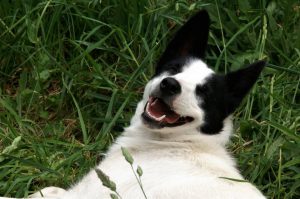My name is Caroline, I’ve recently moved to Golberdon with my dog Eliza. I’ve achieved a dream by buying some land in Latchley, much neglected for many years, my priority is to improve the ground. I’ve worked with goats, and intend to get some Angoras in the near future, but for now I’ve decided one of the ways to begin land recovery, was to get some sheep to graze! I’ve worked with sheep before, and when I started to look into breeds, I just fell in love with the fleeces of UK rare breeds, and settled on a small flock of pedigree Teeswater sheep and I’m now venturing into wool production.
I intend to sell my wool fibre for carding, spinning, felting, and any other crafting hobbies, either as raw locks or hand washed and dyed.A brownie point for those of you who can work out the meaning of the name “Tregaver”….. I wanted to choose a name that reflected my long Cornish family history, and suited the area also!
The non-slaughter flock will provide ethically sourced, sustainable natural fibres suitable for a variety of purposes. Animals will not be culled simply because it has gone past its ‘useful’ life. The animals are on pastures free from man-made chemicals and fertilizers, and I’m working towards gaining organic status. Once a year the sheep will be sheared and the fleeces processed to bring you fibre which has been raised in a way which is both kind to our animals, and also beneficial to the wider environment. The sheep enjoy the highest possible animal welfare standards.
Our world is drowning in plastics, and one of the serious issues that is often not considered are micro-plastic fibres from clothing, which are ending up throughout water courses and our oceans. By promoting the use of sustainably farmed, ethically raised wool, I hope to do ‘my bit’ to stop the wave of plastic pollution in our world.
Our land management:
I believe that we should live in harmony with our natural environment, not work against it, and since I have introduced sheep to our land, have noticed a significant increase in both plant and insect species.
When the land was purchased, there was almost a complete mono-culture of bracken and poor grass. Since grazing the land, and establishing specific areas to allow bracken growth, which can be useful to some insect species, other areas, removing bracken (by cutting and pulling, not with weed killers or chemicals) to allow more varied grass species, and also flowering plant species to develop, which in turn is beneficial for butterflies, moths and of course bees and other winged pollinators.
Land management is approached in a holistic way – allowing the sheep to graze naturally fertilises the land, and by re-seeding areas with wildflowers to encourage a greater biodiversity. Next year native honey bees will be introduced to further the eco-friendly approach to farming.
I look forward to seeing you on my dog walks around the parish, and if you are interested, speaking to you about my venture! tel: 07904647328 email: tregaverfibre@outlook.com
Caroline Rimmer https://www.etsy.com/uk/shop/TregaverFibre www.facebook.com/Tregaver-Fibre
